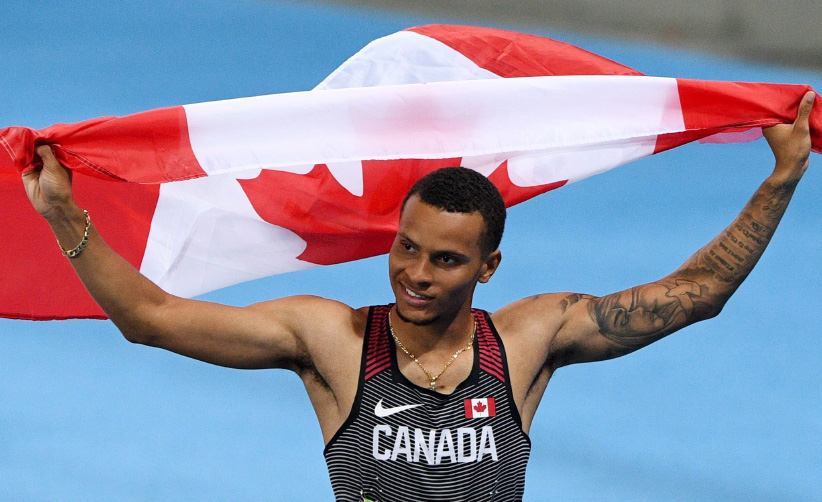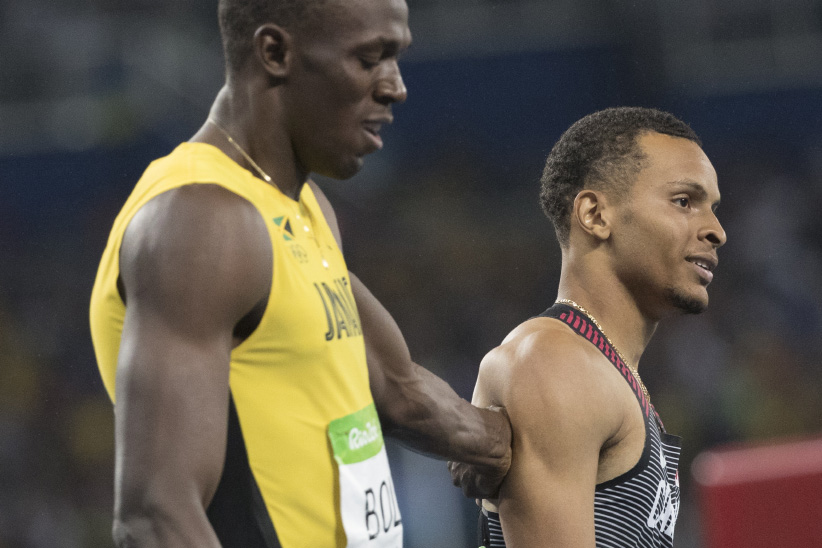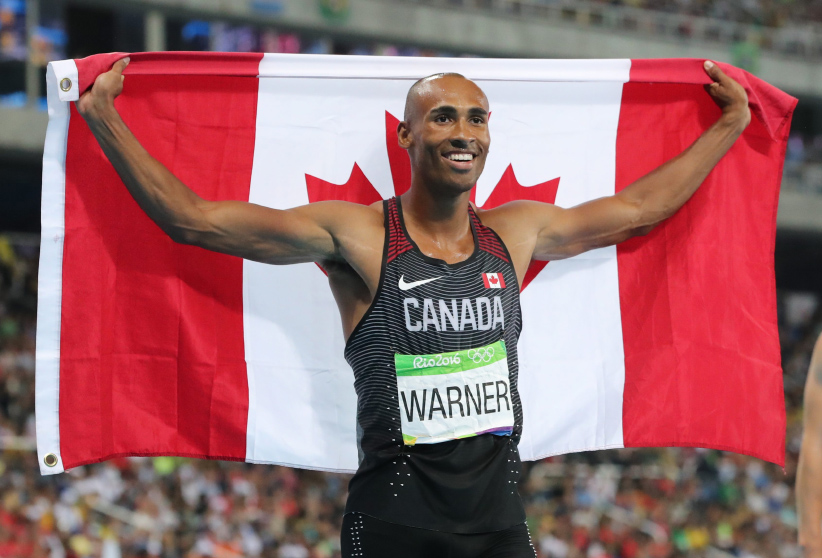On Rio’s track, Canadian stars look like the future
De Grasse, Drouin, Warner, Theisen-Eaton. Suddenly, Canada is on the verge of becoming a Summer Games nation.
Canada’s Andre De Grasse celebrates silver in the men’s 200m final. (Sean Kilpatrick/CP)
Share

Having swagger is a job requirement for a top sprinter. Messing with your opponents’ minds and undermining their confidence is almost as important as the race itself. At that, Usain Bolt is the master.
He did it three times in Beijing. And then four years later in London, thrice more. Preening and mugging in the blocks, stoking up the crowd, unsettling his opponents and sealing the win before the gun ever went off.
Bolt had already done it once in Rio, winning gold in the 100 m. And on Thursday, the 29-year-old Jamaican went back to the tried and true formula yet again. Striding across the track to deafening cheers in the run-up to the 200 m, he played the crowd, smiling and waving. At the blocks, he bobbed his head in time with the rock riffs, even playing a little air guitar. When he was introduced, Bolt danced a few Samba steps, launching the Brazilian fans into orbit.
And when the gun went off, it was, as always, Bolt’s race. Using his long strides, he gradually separated himself from the pack, and by the back stretch, he was alone out in front, crossing the line for gold in a season’s best 19.78 seconds. He knelt down and kissed the track. “Usain Bolt! Usain Bolt!” the for-once capacity crowd chanted for long minutes afterwards.
“I’ve proven to the world that I’m the greatest,” a victorious Bolt said after the race. “This is what I came here for. This is why I said this is my last Olympics. Because I can’t prove anything else.”
But for once, there was someone in his rear-view mirror: Canada’s Andre De Grasse. Legs pumping furiously, right arm chopping air, running almost as fast as the best there ever was—and taking a 200-m silver in 20.02. France’s Christophe LeMaitre won the bronze in 20.12.

“This time a couple years ago, I never thought I’d be in a position to be one of the greatest,” De Grasse said in a moment of post-race honesty. “To be in my Olympic debut and come away with two medals, I never thought that would happen.” But there was a note of disappointment, too. “Now that I’m in this moment, I’m still happy and grateful,” he said, “but at the same time I wanted to come away with a gold.”
De Grasse’s confidence has grown exponentially in Rio, especially after hitting the podium in the Games’ marquee event with a bronze in the 100 m. And he really did seem intent on spoiling Bolt’s quadrennial invite-only Olympic party. In the semi-finals on Wednesday, De Grasse made the Jamaican legend run right to the finish by staging a late push, then looked across the lane with a cheeky grin. Bolt smiled back and wagged his finger, but there was a hint of pique in his post-race comments. “That was not cool,” he told an Australian broadcaster a few minutes later. “You don’t need to do that in a semi, but he’s just young and he’ll learn.”
Tonight, De Grasse wondered if maybe Bolt had been right. “I’m not sure if I used up a little too much energy yesterday,” he said. “Coming home I just didn’t have the same push.”
Stuart McMillan, his coach, maintained the game plan was sound. “We had a strategy to try and tire out Usain last night, and I think we did that,” he said. “That’s why we’re a little bit frustrated. He was there for the taking and we just couldn’t get it done.”
RELATED: Can De Grasse beat Bolt?
The Usain Bolt of 2016 is not the Usain Bolt of 2008, or even 2012, McMillan noted. He’ll turn 30 years old in a couple of days. His legacy project—the first man to sweep all three sprints in three straight Olympics—is almost cemented. But there is a sense that Bolt is a little tired of it all—the press and sponsors and training. And maybe, for the first time in his career, a little scared of losing. Outside the Olympics and world championships, Bolt has hardly run at all in the last few years. Thursday’s 200-m race in Rio marked just the fourth time he has run the distance at a major competition since 2013.
On Friday, the Jamaican 4 x 100 relay team will try to complete the triple-triple, and Canada, with De Grasse running anchor, will take one last shot at dethroning sprinting’s king. “I’m going to try and get the guys ready and say hey, we’ve got a shot at a gold,” said the 21-year-old from Markham, Ont. “I have a lot left in the tank. I think I can do some incredible things.”

De Grasse’s silver capped an extraordinary day for Canada. Less than an hour before, Damian Warner of London, Ont., had clinched an historic bronze in the decathlon, marking the first time the country had won two track and field medals on the same day since the Los Angeles Olympics—the first one—back in 1932. And earlier in the day, Erica Wiebe of Stittsville, Ont., struck a joyful gold in 75kg wrestling, while Montreal’s Meaghan Benfeito took a bronze in 10-m platform diving—her second medal of these Games and third in her Olympic career. The day’s haul brings Canada’s total to 18 medals, tying its showing at London 2012—but with three more golds and three days of competition left to go.
FROM SPORTSNET: Damian Warner on Rio 2016: ‘I’m expecting gold’
The 26-year-old Warner came into the final evening of the decathlon sitting third, but was under serious pressure from Kai Kazmirek, the German who stood fourth. Even after a clutch 63.19-m throw on his final javelin toss of the night, the Canadian only clung to the podium by 44 points. But a season’s-best 1500 m time of 4:24.90 secured Canada’s fourth track and field medal of the Games. The exhausted Warner collapsed at the finish line and lay on the track for a couple of minutes as his competitors bent down to offer their congratulations.
[widgets_on_pages id=”2016MedalCount”]
“There’s only three guys in the world who get to stand on top of that decathlon podium, and I’m one of those guys,” he said afterwards, wrapped in a Canadian flag. “It’s pretty awesome.”
Ashton Eaton, the husband of bronze-winning Canadian heptathlete Brianne Theisen-Eaton, won his second straight gold, tying the Olympic record of 8,893 points. France’s Kevin Mayer took silver with 8,834 points, while Warner scored 8,666.
RELATED: Why is an Olympic gold medallist wearing this on his head?
Throw in Derek Drouin’s high jump gold, De Grasse’s 100-m bronze, and Theisen-Eaton’s third place finish in the heptathlon, and this is now Canada’s best showing in athletics since the ’84 L.A. boycott Games. And with both Canada’s men’s and women’s 4 x 100 relays teams in the finals Friday, and Melissa Bishop running for an 800-m medal Saturday, there may well be more to come. Suddenly, Canada is on the verge of becoming a summer nation.
A message has been sent by De Grasse and the rest of the team. Bolt and the other big names in Rio are track and field’s present. Soon they will be its past. Canada is perfectly content to be its future.
